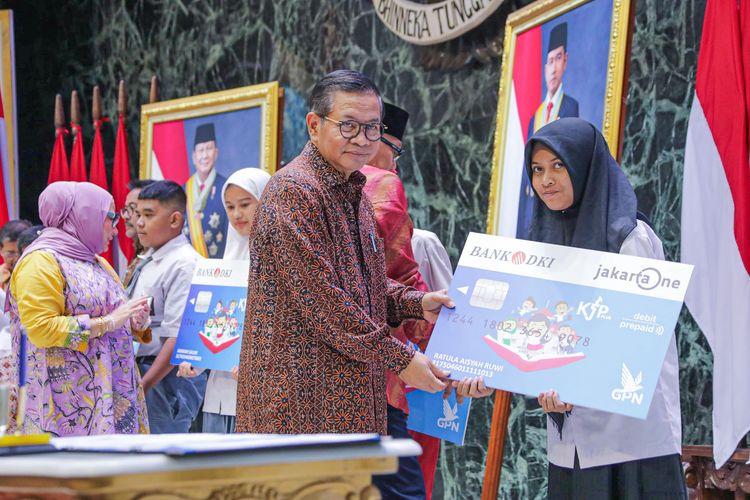
The Shiro Corporation - The Provincial Government of the Special Capital Region (DKI) Jakarta has increased the quota for recipients of the Smart Jakarta Card (KJP) Plus through data updating. This is a manifestation of the government's commitment to improving equal access to education for all layers of society.
Based on the update, the number of KJP Plus recipients has increased significantly compared to last year. In the first phase of 2025, there were 707,622 students receiving KJP Plus, while in the same period last year it reached 523,622 students.
The increase in the number of KHP Plus recipients is accompanied by an increase in the KJP Plus budget reaching Rp 3.2 trillion in 2025.
The Deputy Chairman of the Jakarta Regional Representative Council (DPRD), Rany Mauliani, said that her side supports the budget and policies that support free, quality, and inclusive education for children in Jakarta.
"Education is the main key in building a better future. I hope that recipients of the KJP Plus can utilize it to achieve a brighter future," said Rany, as quoted from Beritajakarta.id, Thursday (03/20/2025).
The Governor of DKI Jakarta, Pramono Anung, said that the DKI Jakarta Government has redirected funds for free breakfast programs to increase the quota for KJP Plus and the Jakarta Superior Student Card (KJMU). He has held a meeting with the National Nutrition Agency to ensure this can be realized.
"We are redirecting funds to increase the capacity of KJP Plus. As for KJMU, which was previously delayed, we ensure it will continue to be provided annually until graduation from university, on the condition that the cumulative grade point average (CGPA) is maintained at a good level," said Pramono, as quoted by Beritajakarta.id on Wednesday (3/12/2025).
In addition to increasing the budget, Pramono also opened complaint posts in 44 districts to improve KJP Plus and KJMU services. With these posts, it is hoped that the public will find it easier to access information if they encounter obstacles during the data collection and receipt process for KJP Plus and KJMU.
Acting Head (Plt.) of the Jakarta Education Department Sarjoko said that this step is a solution to the limitations in space and service time at the Implementation Unit (UPT) of the Central Funding Service for Personal and Operational Education (P4OP) in Rawa Bunga, Jatinegara, East Jakarta, which has been the main service center for KJP Plus and KJMU until now.
I hope that the post will be able to provide convenience and quick, transparent, and targeted services.
"This post serves as an information center for residents who want to know the status of their KJP Plus or KJMU, as well as a place to submit complaints or administrative issues. This post is managed directly by relevant agencies such as the Social Services Department and the Population and Civil Registry Department," said Sarjoko.
As information, the DKI Jakarta Provincial Government has updated the KJP recipient data. Previously, there was a decrease of 525,000 students. However, the number has been updated and increased to 705,000 students.
Meanwhile, for KJMU recipients, the number reaches 15,000 recipients. Based on the data update carried out, it is estimated that the number will increase to 20,000 by 2026.
Jakarta education access barometer
Educational practitioner, Itje Chodijah, believes that updating the data of recipients of KJP Plus and KJMU assistance is a step in the right direction. Because, as a big city, prioritizing equal access to education is essential.
"The issue of educational access is a challenge that the government must face. The need for educational access is indeed always increasing. This must be a concern to be addressed immediately, considering that 12 years of compulsory education is being promoted," said Itje to The Shiro Corp, Monday (June 16, 2025).
Regarding the increase in the number of KJP Plus and KJMU recipients, he believes there are many factors driving this.
The first factor , the increasing number of school-age children. Kedua , society directly feels the benefits of the assistance. Ketiga , data updating efforts make assistance delivery precisely targeted.
"The data update that has been done is already very good. However, there must be an appropriate validation process and it should not be done carelessly. The recipients of aid must truly be those in need, according to the criteria. We must ensure that those who are not entitled do not receive the aid," he said.
Itje also believes that transferring funds from free breakfast for KJP Plus and KJMU is a good decision. According to her, practically speaking, school fees are more important than breakfast, which parents can still arrange for their children.
"If the regulations allow, I think this step is a wise decision. Because without free breakfast, parents can still strive to feed their children. As for entering school, it's not that easy. Considering the funds from the Ministry of Education and Culture are also reduced, so this method could be an alternative," he said.
Itje also recommends that the management of assistance recipients leverage technology aid. Besides facilitating monitoring, utilizing technology such as artificial intelligence (AI) will help in processing data more precisely, including to find valid data related to aid recipients.
In fact, according to Itje, the use of AI can minimize "data manipulation," which often becomes an issue in determining recipients of KJP Plus and KJMU.
From the recipient's perspective, AI-powered monitoring also encourages students to take greater responsibility in using the received financial aid.
According to him, manual data processing is very easy to manipulate. With the help of AI, data updating will be better than manual methods. Data checking can also be easier to do because all student data is consolidated in big data.
"With valid data, there should be no high school (SMA) students in Jakarta who fail to graduate. Jakarta must set the benchmark so that it can achieve 12 years of compulsory education for all children," asserts Itje. (Rindu Pradipta Hestya)
Comments
Post a Comment